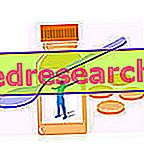Related articles: Mononucleosis
Definition
Mononucleosis, or kissing disease, is an infectious pathology of viral origin, which as such is transmitted through the kiss, but also through coughing or sneezing and sharing glasses or cutlery used by infected people. Mononucleosis, however, is a disease of modest infectiousness, which mainly affects children and young adults. For this reason antibodies against the mononucleosis virus are present in the blood of most people, although they have never experienced any symptoms of infection.Most common symptoms and signs *
- strangles
- Asthenia
- Increase in the ESR
- Increased transaminases
- Yellow Diarrhea
- Dysphagia
- Spleen pain
- Eosinophilia
- Hepatitis
- Rash
- Pharyngitis
- Temperature
- I made clear
- Parotid enlargement
- hypersplenism
- Jaundice
- Tearing
- lymphadenitis
- Swollen lymph nodes
- Sore throat
- Headache
- Mass or swelling in the neck
- Mass or swelling in the groin
- Melena
- Meningitis
- Pancytopenia
- Weight loss
- thrombocytopenia
- Throat Plates
- splenomegaly
- Night sweats
- Pericardial effusion
Further indications
In addition to the symptoms already mentioned, typical of mononucleosis is the swollen lymph nodes (lymphadenopathy). in particular of the cervical ones. In 10-15% of cases there is also a skin rash (appearance of small red spots more or less in relief); hepatic manifestations are more common in the elderly. Symptoms such as fever and sore throat generally disappear within a few weeks, while the sense of fatigue and weakness, as well as the increase in the volume of the spleen, can last longer. Precisely the persistence or recurrence of the typical symptoms of mononucleosis must suggest an immediate medical consultation, especially to those who are weak or have an immune system compromised by drugs or diseases (eg HIV / AIDS), which greatly increases the risk of complications.



